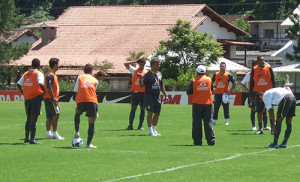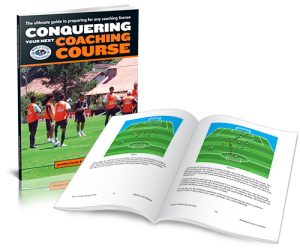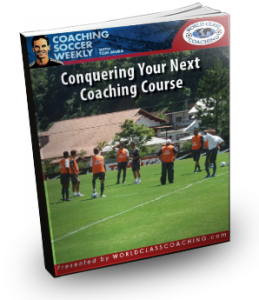Podcast: Play in new window | Download
Subscribe: Apple Podcasts | RSS
This episode includes an interview with Jonny Carter. Jonny is the Academic Director for ‘Education Football’ which offers UK accredited courses on the concepts of soccer. He is also an author who has published a number of books through WORLD CLASS COACHING including ‘Coaching Possession with a Purpose’ and his latest, ‘Conquering Your Next Coaching Course’.
Jonny has traveled throughout Europe, America and much of Asia learning and sharing his unique perspective on coaching and player development. He has earned an NSCAA Advanced National Diploma as well as an AFC A License.
I asked Jonny to join me to talk about the focus of his latest book, how to prepare and excel in your next coaching course.
If you fail to prepare, you prepare to fail. If you’re serious about passing a coaching course, you need to start preparing months in advance. After all, it’s not a fun break when you can relax. Coaching courses are high pressured, stressful and expensive. You either pass and get certified or face the disaster of all your time and money being wasted, and failing to earn a promotion or a new role.
If you want to advance your career, Conquering Your Next Coaching Course – The ultimate guide to preparing for any coaching license, is essential reading. It’s a unique guide on exactly what to expect at every stage and what to do to impress the assessors. With these valuable insights, you know exactly what’s expected of you before you arrive. Instead of massive pressure and stress, you’ll feel confident and ready to pass.
Interview Highlights
Tom: What do you think every coach should do before their next coaching course?
Jonny: I think preparation, making sure that when you arrive on the coaching course is that you know what to expect, you know what you’re going to be doing, and give yourself the best chance of, well not just surviving, but thriving and earning your certificate rather than just going and collecting knowledge.
Tom: What do you think the best way to kind of find out what’s going to happen?
Jonny: I think that was the motivation for the book, that it is quite difficult to find out what to expect. Sure, you can go and ask your colleagues, you can ask people who are on the course, or have done the course, maybe even delivering the course. You can read the websites of the authorities, the bodies who are delivering the coaching course, but until you go through it and live through it, it’s a very, very unique environment. And it’s very, very difficult to kind of replicate that or read about it, or watch a video, and understand it truly. So if you can learn a little bit and ideally practice a little bit beforehand, then I think it solves some of the problems. But there’s no true, real way to understand and prepare for a coaching course, because it’s a very, very tough environment.
Tom: How do you suggest people practice for that environment and kind of get used to it?
Jonny: So, understand what sessions are potentially are going to be asked of you. And then you got a chance to pick out those things, pick out those topics and practice them, understand how you might want to set up your drills or activities, understand what coaching points you’re going to be looking for. Understand where the play is going to break down and recognize those triggers for your coachable moments. So if you can get a chance to practice those in an environment that is familiar to you, so with your players, in your fields, and in your time and your mistakes where nobody is really watching or judging, then when you do get to that environment where you are being watched, you are being judged and it is unfamiliar, at least you have some security of knowledge to fall back on because at least you’ve done the activity before.
Tom: What are the mistakes that you see that coaches most often make in the coaching course? Whether it be in the presentation phase or in the learning phase, what are the mistakes that you warn coaches against?
Jonny: I think sometimes an important component of is to understand what the examiner or the assessor is looking for, or try to understand what the organizing body who’s delivering the course is looking for. And that might be in conflict with your own personal values, with your own personal thoughts and opinions. What they say might be different from what you think, but I think trying to enter into a fight to present your own personal thoughts rather than conforming to what they’re looking for, I think it’s something that goes wrong. They try and argue their own point “Well, I think it should be done this way.” And of course they’re not wrong, but you’re arguing with the person who is ultimately responsible for your score at the end of the day.
Tom: Now, during the course, when you’re running your sessions, discuss talking about how the difference between coaching a session and managing a session. Can you talk about the difference between those two?
Jonny: For sure. It’s difficult sometimes for coaches to comprehend the difference. But that’s what the job title is, is that you need to teach soccer. You need to teach something. It’s not a case of “Right, I’ve picked a good drill out of a book or on a video, or I’ve made it up myself. I throw down the marker disks on the floor, I set up the goal, I give the colors out to the teams. I know where the balls need to be. I know how we start, I know how to finish, off we go. And then we run the activity for 10, 12, 15 minutes, whatever it is. And then we pack up and we move on to something else.” That’s managing the activity – making sure that the rotations are correct, making sure the players are safe, making sure there’s enough equipment, but there’s no skill involved in that. There’s no talent involved in that.
Anyone can print off a session plan, or watch a video and manage a session. The true art to it is can you use that activity to teach, to improve, to make those players better – tactically, technically? Can you improve their decision making by helping or using that activity to help you teach? So instead of the coach being at service to the activity, it should be the other way round.
Tom: Are there three things that you think that every coach could do to get the most out of attending a coaching course?
Jonny: …the first thing is that you want to be successful, you want to get this certificate at the end of the day. .
Have a look how they (the instructors) presented their courses, or their sessions rather. Have a look how they are setting up their session plans. Have a look how they are talking, have a look how they are doing things. And they will give you this information, they’ll tell you about their methodologies and show you their methodologies, and then use them. Even if they are in conflict with maybe what you believe, I think it’s important to answer the question that they’ve given you, how they want it to be answered. So I think that’s an important thing.
And then my final thing is I think it’s important to go and embrace the whole coaching course environment. Coaching course environment is very, very difficult very, very stressful, but it’s also fantastic. It’s also great education.
The complete transcript that includes our complete discussion is available in the printable show notes below.
Printable Show Notes
The show notes for each episode are accessed through the WCC Training Center.
They are FREE but you will need at least a Free Membership to the Training Center in order to view and print them.
Click on the image of the notes and if you’re already logged in to the Training Center you’ll be taken to the Podcast page. If you’re not logged in your be taken to a login page where you’ll also be able to login or register if you are not already a Member.
Remember!
Make sure you subscribe to Coaching Soccer Weekly through iTunes, or your podcast provider of choice, to be sure you never miss an episode.
We would appreciate it if you would leave us a 5 star rating and a written review on iTunes to help spread the word about the show and the information that we are sharing here.
In the Next Episode
In next week’s episode I’ll share a training session that I often use with my teams at the beginning of the indoor season.



